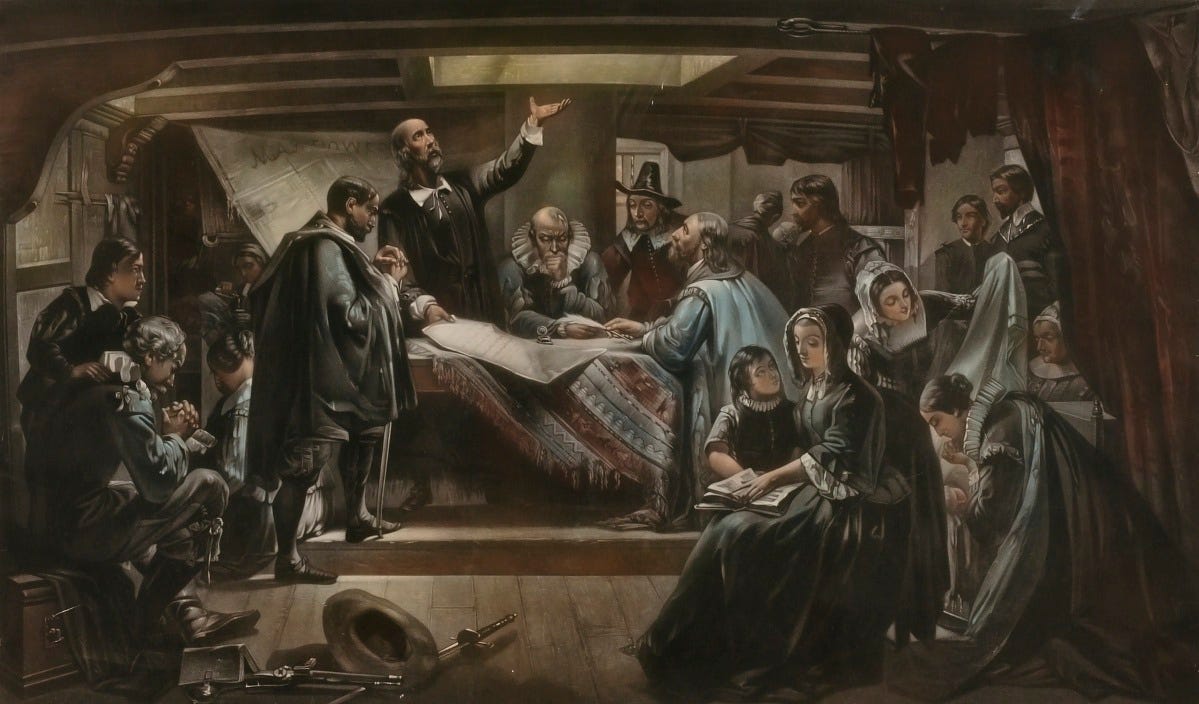The Mayflower Compact
A Pilgrim gift to our American Republic.
By David S. Kerr
WRITER
Founding father and second President of the United States John Adams credited the Mayflower Compact as being one of the foundation stones of the Declaration of Independence and the U.S. Constitution. Other framers, including Thomas Jefferson, offered similar comments.
But the Mayflower Compact wasn’t like the other statements and declarations that helped guide our founding fathers. It wasn’t as expansive as the Magna Carta and it didn’t borrow from the legacy of the ancient Greeks and Romans or, for that matter, from the philosophers of the Enlightenment.
Rather, it was a simple document borne out of practicality and necessity.
On Thanksgiving Day, we celebrate the Pilgrims and their remarkable feat of survival in the New World. But we sometimes forget how close they came to not making it to the New World at all. Or just how desperate a situation they faced when they arrived.
Their ship, the Mayflower, didn’t have a lucky voyage. It nearly sank riding out a late season hurricane and was blown off course. Their goal had been the Virginia Colony, but when they made landfall, they were off the coast of modern-day Massachusetts. It was unexplored wilderness, and they were entirely on their own.
They were also a far more diverse group than history often describes. Roughly half of the settlers were Pilgrims (Puritans) and the other were men and women skilled in farming, carpentry, and other trades, as well as a few old-fashioned adventurers.
However, all was not well within this unusual band. Tension was in the air. Arguments about how to proceed and who was in charge had already started. They had heard the rumors about dissent and infighting in the Virginia Colony and knew they didn’t want to break into that kind of factionalism.
The debate on how they would govern themselves isn’t recorded. They probably discussed several options. However, the framework they devised was elegant in its simplicity, with implications that were much more far reaching than any of these intrepid souls could have imagined at the time.
The principal paragraph of the Mayflower Compact is short and to the point: “Having undertaken, for the Glory of God, and advancements of the Christian faith and honor of our King and Country, a voyage to plant the first colony in the Northern parts of Virginia, do by these presents, solemnly and mutually, in the presence of God, and one another, covenant and combine ourselves together into a civil body politic; for our better ordering, and preservation and furtherance of the ends aforesaid; and by virtue hereof to enact, constitute, and frame, such just and equal laws, ordinances, acts, constitutions, and offices, from time to time, as shall be thought most meet and convenient for the general good of the colony; unto which we promise all due submission and obedience.”
It seems innocuous enough, but it wasn’t. Everything about this statement was new and radical, though the Puritans and their fellow travelers probably didn’t see it that way. To them, it was a practical matter. They were a long way from home and had to find some way to govern themselves. What the Mayflower Compact did was give every man, regardless of station, a vote. This was no precedent for this kind of arrangement anywhere in the world.
The barrel maker’s vote carried as much weight as a Pilgrim farmer. But beyond that, it declared that the colony would abide by the decisions of the majority of the “civil body politic.” It was a democratic system. There was, for all practical purposes, no such thing in the 17th century.
Except, that is, amongst the Pilgrims. Being so far away from England and from the Virginia Colony, the compact made no reference to approval from royal authority. It dutifully and repeatedly acknowledged the supremacy of the English king, but there is no reference to royal assent. They were doing this on their own.
What the document established was a completely self-governing colony. Little did they realize that their compact, written in their eyes only as a matter of necessity, would, some 157 years later, help inspire a new nation. Consider that when you sit down for your turkey and dressing and an afternoon of watching football. It’s even more reason to celebrate.
David Kerr is a Stafford resident and an adjunct professor of political science at VCU. He worked on Capitol Hill and for various federal agencies for many years.
Local Obituaries
To view local obituaries or to send a note to family and loved ones, please visit the link that follows.
Support Award-winning, Locally Focused Journalism
The FXBG Advance cuts through the talking points to deliver both incisive and informative news about the issues, people, and organizations that daily affect your life. And we do it in a multi-partisan format that has no equal in this region. Over the past year, our reporting was:
First to break the story of Stafford Board of Supervisors dismissing a citizen library board member for “misconduct,” without informing the citizen or explaining what the person allegedly did wrong.
First to explain falling water levels in the Rappahannock Canal.
First to detail controversial traffic numbers submitted by Stafford staff on the Buc-ee’s project
Our media group also offers the most-extensive election coverage in the region and regular columnists like:
And our newsroom is led by the most-experienced and most-awarded journalists in the region — Adele Uphaus (Managing Editor and multiple VPA award-winner) and Martin Davis (Editor-in-Chief, 2022 Opinion Writer of the Year in Virginia and more than 25 years reporting from around the country and the world).
For just $8 a month, you can help support top-flight journalism that puts people over policies.
Your contributions 100% support our journalists.
Help us as we continue to grow!










I enjoyed reading this bit of history. Thanks.